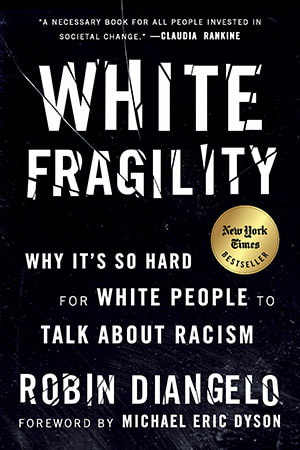from acknowledging my racism because that would put me in the category of “bad person.” For you to point out that something I said or did hurt, is to call me a bad person and raise all my defenses to protect my image as a good person. You are now the bad person for accusing me of being racist, and the whole conversation has shifted to your offensiveness and away from my original racially hurtful comment or action—hence the title “White Fragility.” Instead, given the potential repercussions of a black person offending a white person in this society (status loss, job loss, violence), we should view such feedback as a mark of trust, that I was viewed as a person strong enough to hear and learn.
Some time ago I read Jodi Picoult’s book Small Great Things. It has a similar theme of exposing racism in a progressive white who thinks she isn’t racist. Small Great Things is about a labor and delivery nurse accused of murdering a baby. The author uses multiple point-of-view characters to get at the deep emotions of her story. Two are opposite extremes: Ruth, a compassionate, college-educated, don’t-rock-the-boat black woman who has spent a lifetime fitting into mainstream society (catering to “white fragility” as DiAngelo would have it), and Turk, radical white supremacist father of the baby who died of complications following circumcision due to an undiagnosed genetic abnormality. (I’m not giving away anything here; you know quite well from the beginning that Ruth did not “do it.”) But the POV character I identified with most was, Kennedy, a liberal female, do-gooder public defender who thinks she’s not racist. Defending Ruth is an education for Kennedy, who has defended many African Americans in the past, but never one like Ruth who lets her see into the realities of life for someone of color. This book is about white privilege. It is about all the stuff that never crosses my mind, but must be taken into account by someone of color—things like being followed by store security to be sure you aren’t shop lifting or how your son is treated when he questions armed men in uniform barging into your home at 3 AM to cart you off to jail in your nightgown. Taken together these two books are fictional and non-fictional descriptions of the same idea—racial disparity is still a major controlling factor in our society to which we white are mainly oblivious. DiAngelo argues that regardless of my individual actions, I carry the actions of my group (Black or White) as baggage wherever I go--the assumption that a black teen in a hoodie is up to no good or that a white person who dresses as a black celeb for a costume party is mocking. Until we bring these things out into the open, we can’t deal with how they influence our attitudes and relationships. I can’t help thinking of the girl we called Hershey in junior high. I was an adult before I realized that was NOT the name on her birth certificate. Or consider the Confederate monuments in the South and their different meanings to different groups. Monuments glorify; memorials mourn. Where are the southern memorials to those who were enslaved or those who have been lynched in the last 175 years? I think of the different attitudes toward WWII in Germany and Japan. Germany is full of memorials and reminders “Never Again.” Not wanting to talk about the evils of the past, Japan swept the Rape of Nanking and the truth of Korean sex slaves under the rug, giving them barely a footnote in history books if not actually denying them. Today the Japanese have trouble understanding why other Asian countries are still so bitter about World War II after all these decades. Until we are willing to openly discuss our nation’s past and present mistakes and humbly listen to the pain, we cannot hope to heal the breach in our society. I highly recommend both of these books. You won’t agree at every point. You will no doubt feel defensive at points, but I hope you will listen and learn.
0 Comments
Leave a Reply. |
AuthorLeAnne Hardy has lived in six countries on four continents. Her books come out of her cross-cultural experiences and her passion to use story to convey spiritual truths in a form that will permeate lives. Add http://www.leannehardy.net/1/feed to your RSS feed.
To receive an e-mail when I post a new blog, please subscribe.
Categories
All
Archives
November 2022
|

 RSS Feed
RSS Feed